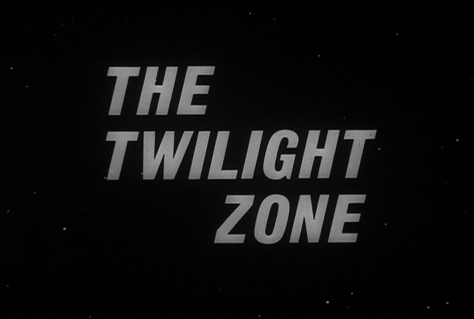
by Natalie Devitt
Last month I touched on the possibility that The Twilight Zone could be running out of ideas, considering that a number of the stories seemed to rehash a number of previously done storylines. I concluded that as long as the recycled stories seemed to work, I was not going to judge the episodes too harshly. That is, until April’s episodes aired. So, which episodes fared the best?

The New Exhibit, by Charles Beaumont

If you have a taste for the macabre, you’ll surely love The New Exhibit. The episode is the story of a dedicated wax museum employee by the name of Martin, who loves his job so much that he takes it home with him. Martin, played by actor Martin Balsam, someone who you may recognize from Psycho and The Twilight Zone's The Sixteen Millimeter Shrine, is informed by his employer that the wax museum where he curates an exhibit called “Murderer’s Row” will be closing soon.
Upon hearing the news, Martin offers to watch over the figures that he has spent years meticulously caring for, until a buyer for the figures can be found. He houses the sculptures in his basement, much to his wife’s dismay. As time passes, Martin begins to care a little bit too much to the effigies of famous murders, like Jack the Ripper and Henri Désiré Landru.
The New Exhibit brilliantly captures one man’s descent into madness. There is not one scene that does not advance the plot. With each moment, the audience sees the great lengths that Martin is willing to go in order to keep the wax figures to himself.
To top things off, Martin Balsam does a great job of playing a man who has an increasingly difficult time telling the difference between fantasy and reality. A man who begins the story innocently wondering what could drive a man to commit some pretty heinous crimes, but then turns into a man who may be willing to commit a few heinous crimes of his own.
Aside from the fairly predictable ending, I really enjoyed The New Exhibit. I give it four stars.
Of Late I Think of Cliffordville, by Rod Serling (based on "Blind Alley," by Malcolm Jameson)

In Of Late I Think of Cliffordville, character actor Albert Salmi plays William, an aging business man, who after achieving great success still feels unfulfilled. One night after work, he gets drunk and confesses to the janitor at his office that his achievements mean nothing, and that he would like nothing more than to return to his hometown of Cliffordville, Indiana.
Shortly after this confession, he discovers a new travel agency in his office building. The travel agency is owned by a striking young woman named Miss Devlin, played by statuesque dancer-turned-actress, Julie Newmar. Miss Devlin, who wastes no time revealing that she is the devil, offers to send William back to his boyhood home of Cliffordville. Insisting that he can keep the knowledge that he has gained over his life, but still start over looking like a young adult, William agrees to Miss Devlin’s offer.
How long has it been since we had a story about some man who tries to change the past or makes a deal with the devil? The answer: one month. I know these have been reoccurring stories throughout the series, but I have to wonder if The Twilight Zone has gotten so desperate for stories that they don’t even bother waiting to recycle their ideas anymore.
To make matters worse, I do not really believe Albert Salmi in the scenes where he plays an older version of William. While the episode’s special effects makeup looks fine, it is not great. Additionally, Albert struggles to really disappear into his role as an old man looking back on his life. On the other hand, Julie Newmar makes a very charming villain in this episode.
This episode never really seems to hit its stride. For that reason, I give it two stars.
The Incredible World of Horace Ford, by Reginald Rose

The Incredible World of Horace Ford is about a man consumed by the past. His name is Horace and is played by Pat Hingle. He is in his late thirties, married and has a job designing toys. Wracked with stress for having to be his family’s breadwinner, he escapes by spending most of his days thinking and talking about his childhood.
One day Horace decides to visit his childhood neighborhood, and to his surprise he finds that not a single thing has changed. He returns few more times to find that it is as if the past keeps on playing again and again. If that was not strange enough, he also finds that the boys he knew as a child never grew up. Horace soon realizes through these trips down memory lane that the past is not exactly the way that he remembers it.
While I do not think an audience needs to like a character, they do need to care about them. I hate to admit that I struggled to care about Horace. Pat Hingle is a perfectly capable actor, but I think he may have been miscast as Horace. He just seemed like an annoying man-child. Also, some of the dialogue involving Horace’s overbearing mother, did not flow very well and at times was unintentionally funny.
Overall, this episode was very unsatisfying. I really hate to give it only one and half stars.

With the exception of the stellar The New Exhibit, this was easily the least enjoyable bunch of episodes I have watched this season. I really hope that things improve. We only have a few more episodes left in the season.
!function(d,s,id){var js,fjs=d.getElementsByTagName(s)[0],p=/^http:/.test(d.location)?'http':'https';if(!d.getElementById(id)){js=d.createElement(s);js.id=id;js.src=p+'://platform.twitter.com/widgets.js';fjs.parentNode.insertBefore(js,fjs);}}(document, 'script', 'twitter-wjs');


























































